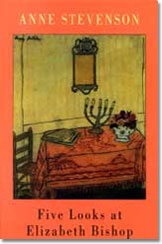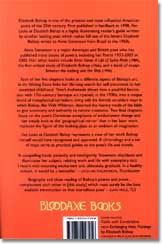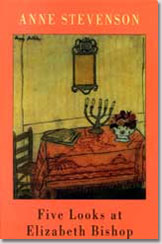Criticism
A sample of literary criticism by Anne Stevenson


Colin Winborne reviews Five Looks at Elizabeth Bishop in The Uses of English, Autumn, 2006.
"...I would strongly recommend Five Looks at Elizabeth Bishop: it is one of the most sensitive and careful readings of Bishop's work that I have yet encountered. Stevenson's avoidance of academic jargon makes it accessible to the general reader as well as appealing to the specialist, and the study also benefits from the fact that she writes with the ear (and eye) of a poet."
On Poetry and Science:
"A bad habit we've acquired...is that of separating science - knowledge - from poetry, a word derived from the Greek poiein, to make or create. The war between science and the arts probably flared up towards the end of the eighteenth century, in England at the time of Blake, and later Keats, when philosophical systems based on skepticism and abstract reasoning threatened the poets' delight in the mysterious. Wordsworth, though, in his Preface to the Lyrical Ballads looked forward to a time when "the poet will lend his divine spirit to the transfigurations" that he foresaw science bringing about. Today, science has immeasurably increased our sense of mystery, while it has certainly created a material world in which, with all the other species, we teeter on a razor's edge."
From BETWEEN THE ICEBERG AND THE SHIP:
University of Michigan Press, Poets on Poetry Series, 1998
On Symbols:
"Surely language and mathematics are different ways of using symbols to communicate meaning. Mathematical formulae do express limited, irrefutable truths that words can't. That's probably why numbers have been held to be supernaturally powerful in the past. But then words can express so much else! What could be more narrowly binding to the spirit than the principle of logic, the form of language closest to mathematics?
From an interview with Richard Poole, editor of Poetry Wales.
On Women Poets:
"The women poets I favour, though feminists, have not put writing poetry at the service of their politics. What a self-perpetuating critical establishment, male or female, approves of or not is fundamentally of no concern to them. For when a poet or novelist is "really writing", as Sylvia Plath put it-- slipping perhaps into sudden ease after a long struggle -- then the whole labelling apparatus of criticism, ideology, competition and self-consciousness becomes irrelevant.
From Some Observations on Women and Tradition
On the Ideal Poem:
"In my book, the ideal poem of the next century will not be a game of hunt the references. It will not be a furious tirade, or an in-depth self-interview, or a river of tears that floods its banks with self-pity. It will not mistake novelty for originality. It will not be afraid of learning from the poetry of the past, but it will not be imitative either. For a while it may not win poetry prizes, for it won't be written with "promotion" in mind. Nor will it be written by a culture, a gender, a race, a nation, a political party or a creative writing group. Although many such influences may flow into the writing of it, in the end it will be written by a very rare person - a poet who is in thrall to nothing but poetry's weird tyranny and ungovernable need to exist."
From the Anthology STRONG WORDS, Bloodaxe Books, Uk, 2000:
